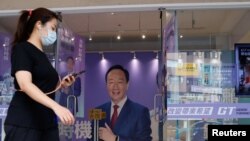Taiwanese Vice President Lai Ching-te responded Tuesday to China's probe of the Taiwan-funded giant Foxconn over the weekend, saying Beijing should "cherish" Taiwanese companies and refrain from pressuring them during the run-up to January’s election.
Chinese tax and natural resources authorities in multiple provinces searched Foxconn's facilities on Sunday, as first reported by China's state-owned Global Times.
The news came at a sensitive moment because Foxconn’s founder, Terry Gou, is expected to qualify to run in Taiwan's January 2024 presidential elections as an independent candidate. Taiwan is a self-governing island that China claims as its own territory.
Foxconn, among the world’s largest contract manufacturers, doesn’t make anything under its own name. Apple is a key client of the company, which is registered as Hon Hai Precision Industry Co., Ltd. and employs hundreds of thousands of people in its operations throughout China.
Chinese authorities did not disclose the content or results of the inspections at Foxconn.
Many analysts see China's probe as an attempt to intervene in Taiwan's elections by forcing Gou out of the upcoming elections for fear that he will drain votes away from pro-Beijing candidates with a better chance of winning.
In the past, Gou has blamed hostility toward China by Taiwan's ruling Democratic Progressive Party (DPP) for the rising tensions between the two countries.
The Global Times quoted unnamed experts saying Gou's candidacy will benefit Lai, who is also running for president and is deemed a “secessionist” by Beijing.
The English-language report went on to cite experts, saying “that if the secessionists who seek ‘Taiwan independence’ win the elections, that would be a huge disaster to the peace and stability of the region.”
Since the DPP's Tsai Ing-wen took office as the island nation's president in 2016, Beijing has taken increasingly aggressive actions, including sending fighter jets and aircraft carriers near the island.
Foxconn, which has its headquarters in Taiwan, issued a statement on Sunday saying complying with the law was one of its "basic principles." It promised to “actively cooperate with the relevant units on the related work and operations."
Gou, a billionaire, handed over the management rights at Foxconn four years ago. His presidential campaign spokesman, Huang Shih-hsiu, told VOA Mandarin, "The tax probe Foxconn faces in China has nothing to do with us."
Lai, speaking at a news conference in Taipei on Tuesday, responded to the Foxconn investigation by saying China should "cherish and treasure" Taiwanese companies that are helping it to develop economically.
"During an election, China does not need to put pressure on Taiwanese companies," said Lai, the frontrunner, adding that if Taiwanese companies lose confidence in China, they will move production elsewhere.
Gou officially announced his candidacy on August 28. The next day, Wang Zaixi, former deputy director of the Taiwan Affairs Office of China, publicly said Gou’s candidacy would further divide the parties opposing the DPP, which could eventually "let Lai Ching-te take advantage."
Gou must gather close to 300,000 voter signatures by November 2 to qualify as an independent candidate, according to election regulations. The Central Election Commission will review the signatures and announce the results by Nov. 14.
Liang Shu-yuan, assistant research fellow with the Division of Chinese Politics, Military and Warfighting Concepts at the Institute for National Defense and Security Research in Taipei, believes that China has repeatedly made clear its dissatisfaction with Gou and is using the Foxconn investigations to "suppress" Gou.
Liang told VOA Mandarin, "Imposing punitive measures such as fines to collapse [Foxconn] is never a positive development for the Chinese government. If the probe has a limited economic impact, we can view it as sending a clear political message: They [China] don't want Terry Gou to keep running."
China has a history of attempting to influence Taiwan's politics by cracking down on Taiwanese businessmen.
In November 2021, Chinese authorities fined the Taiwan-funded Far East Group 474 million yuan, or $64.8 million, and reclaimed idle construction land in five provinces and cities, accusing the company of illegal and irregular behaviors.
Zhu Fenglian, then-spokesperson of the Taiwan Affairs Office, told reporters that Taiwanese businesspeople shouldn’t donate to "Taiwan independence die-hards," indicating that Far East Group was punished for donating $2.09 million to the DPP in the 2020 regional elections.
Analysts say China's tactic may backfire when applied to Gou.
Titus Zhijie Chen, an associate professor of political science at Sun Yat-sen University in Taipei, believes that Taiwanese businesspeople must yield to Beijing due to their economic interests in China. But because Taiwanese voters lack that financial motive, they can’t be coerced. Chen said that in previous elections Taiwanese voters used their votes to send China a message.
Other observers say the probe appears to be a warning from Beijing to Foxconn to dissuade it from leaving China.
On Sept. 17, V. Lee, who heads Foxconn’s operations in India, said on Facebook that Foxconn planned to double its workforce and investment in India by next year, according to Reuters.
Foxconn, which has an iPhone factory in the state of Tamil Nadu that employs 40,000 people, will invest $600 million in two projects in the state of Karnataka for making casing components for iPhones and chip-making equipment.
Liang said that faced with post-pandemic economic weakness and high unemployment, the Chinese government understands that if Foxconn leaves China, other companies might not be able to employ such a vast workforce.
Adrianna Zhang contributed to this report.




